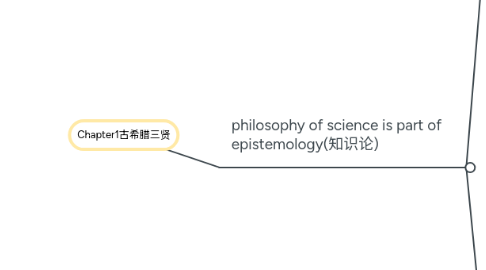
1. philosophy of science is part of epistemology(知识论)
1.1. rationalism
1.1.1. 苏格拉底
1.1.1.1. 中心问题:how to live a good life?
1.1.1.2. 更偏向于伦理而非知识论
1.1.1.3. 承认自己什么都不知道
1.1.1.4. socratic dialogue(intellectual midwifery助产)——通过一系列有逻辑型的问题来了解真相
1.1.2. 普罗塔格拉
1.1.2.1. 人是万物的衡量标准
1.1.2.2. 世间没有不变的真理
1.1.3. pre-socratici
1.1.3.1. Heraclites of Ephese(赫拉克利特): 不可能踏入同一条河两次,nothing is, everything becomes
1.1.3.2. Paramenides of Elea(巴门尼德):表象是欺诈的(deceptive), everything is, nothing becomes.真实的存在意味着没有变化
1.1.3.3. 哲学四大要素:fire, water, air, earth
1.1.4. 柏拉图
1.1.4.1. 更加系统的思考,重点在形而上学和知识论
1.1.4.2. perception≠knowledge, 认知对每个来说是不一样的,因此不是知识,knowledge is about how things really are
1.1.4.3. theory of forms: 现实不是这个世界的认识,而是从一个完美世界反射过来的,这个世界无法通过经验去感知,只能通过理性分析获取通道 allgeory of the cave
1.1.4.4. nativism: ①人类拥有内在的想法,不需要后天的观察②reincarnation(再生)使得灵魂忘记了原有的知识③学习只是通过reasoning来记起知识
1.2. empiricism
1.2.1. 亚里士多德(不完全是经验主义)
1.2.1.1. 专注于‘this worldly' 而非’other worldly‘(所谓完美反射的世界)
1.2.1.2. the mind is tabula rasa白板
1.2.1.3. organon(工具法,推理法)
1.2.1.3.1. 经验:science (episteme知识)consists in discovery of causes of objects
1.2.1.3.2. 理性:reasoning from basic theoretical principles to particular cases
1.2.1.4. syllogism三段论
1.2.1.4.1. 在induction不完全确定为真理的条件下也可以做三段论,但结论会成为personal opinion而不是知识episteme
1.2.1.4.2. the principles of knowledge: causative immediate and truth
1.2.1.4.3. ①experience: from concrete to abstract (induction) ②explanatory principle: from particular to general
1.2.1.4.4. induction的问题:不管观察过多少实例,induction永远做不到完全certain
1.2.1.5. intuitive causality detection system
1.2.1.5.1. universal validity并不遵循观察和经验
1.2.1.5.2. nouss:the truth of the universal causal principles is apprehended by a special and infallible intellectual capacity called~(理性,精神,常识)
1.2.1.5.3. thus, Aristotle is not a radical empiricist.
1.2.1.6. 4 causes
1.2.1.6.1. formal, material, efficient, final
1.2.1.6.2. 能够解释某物的基础,就是要有造成某物的这四个原因(by rational activity)
1.2.1.6.3. 在科学革命后只有efficient causes被接受
